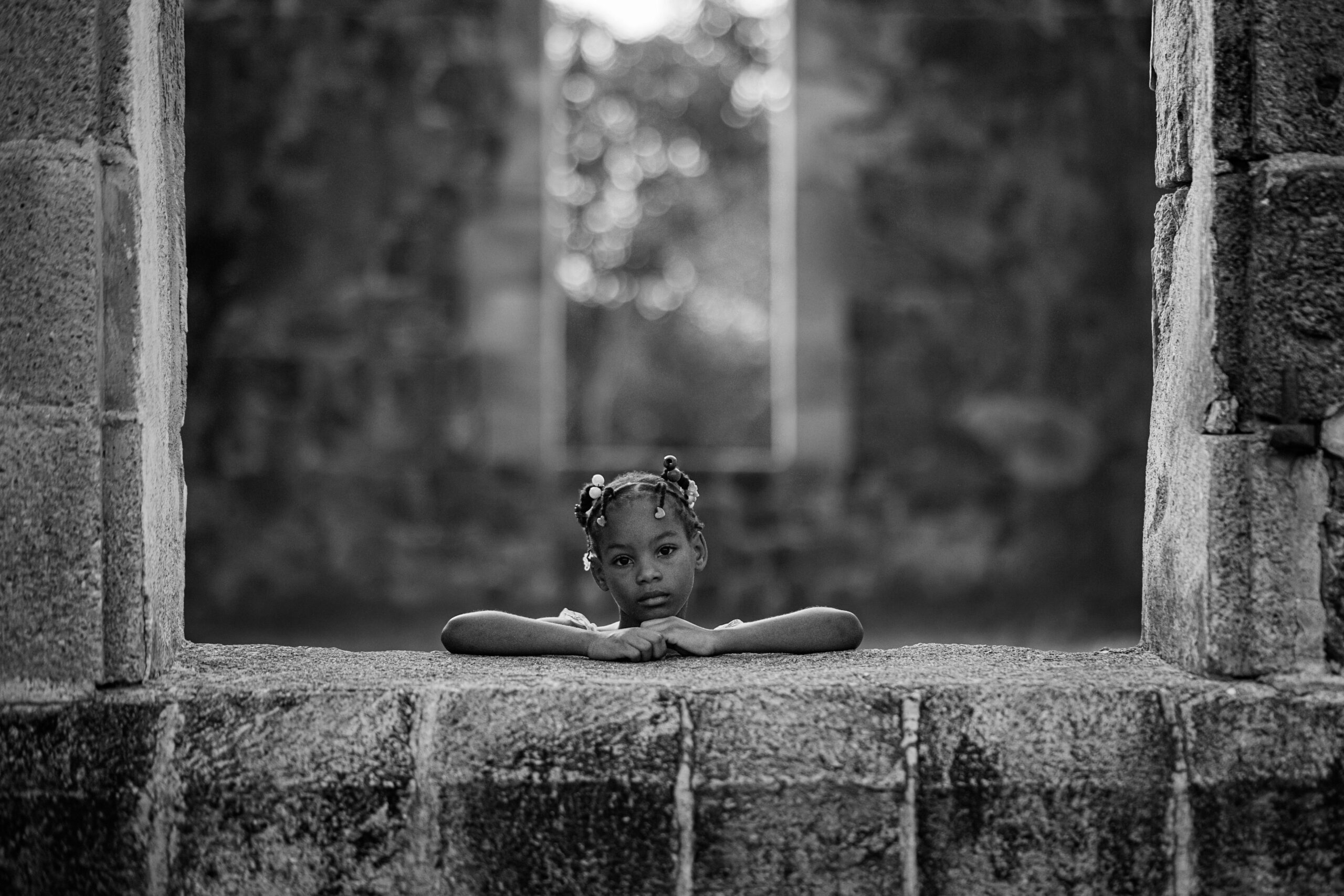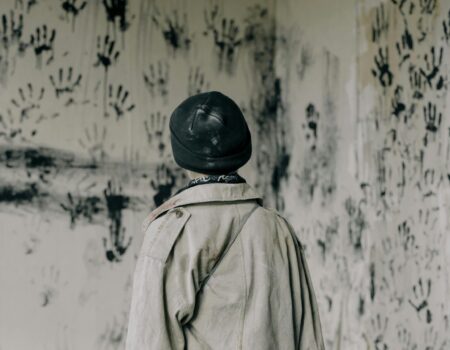When Abike goes missing, it is the fourth day of the rains in August. A lazy morning, where angry, chirping birds are the only ones awake, sees the girl swim through the village river to the other side of the forest, toward God knows where. The day begins and the villagers trot about in the light of a waking day, scratching at itches on their backs and knees from having slept on the floor where the crawling insects host late night festivities.
The day stretches into itself, and most men are on their way to their farms, baskets with countless eyes on their heads when the girl’s mother realizes she is missing. So, she screams, and the day finally breaks for the sluggards yet to rise from their place on the ground.
You are in Abike’s father’s compound when the older men band together with a plan to find the girl. Her brother is amongst them, and he holds her wrappers that were left bound together on her bed, her fading schoolbooks stuffed where her head would have rested at dawn. It is unclear whether she has run away, or someone has crept into the room from the window to steal her away. You are seated on the floor, away from the eyes of the worrying adults, hiding secrets of where the girl has gone.
Someone suggests that she must have come out at night to drink water or ease herself and then taken by a man that had never seen a girl as beautiful before. The air tenses and speculation escalate to apprehension. Abike’s father’s face contorts in anger, and in that moment of pain and anger, you see a subtle resemblance to his daughter.
The pounding of feet out of the compound and into the path toward the trees is rhythmic and bears a dark omen for whoever may have taken Abike. The men are angry, but more so they are afraid for their own daughters and wives. Anger is a potent source of adrenaline, but fear does more damage than forest fires, and so whoever may have taken the girl knows too little of what follows him.
A week passes and nothing is found. No girl and no sign of whatever may have taken her. The village oracle asks her father to make a sacrifice of a living goat, to bury the screeching animal by the riverfront in the dying light of the evening, so the gods may bring back his daughter.
Your father takes you along for the ritual, however uncommon it is for women to be present during important sacrifices. You know it is because he believes that you hear the gods in your sleep, and perhaps being present for the sacrifice will draw their spirits closer. You look away from the unmarked hole that your cousin, Bandele, digs, but cannot keep your eyes closed when the bound goat screams until the ground is covered up completely.
The voices start to whisper to you on the day the sacrifice is buried. They call from across the path where the river spies on the ritual parade, glistening with the sunlight, both peeking to listen to the dying sacrifice. You hear the voices of the river calling to you, but you ignore them, picking at your brittle hair and the dry scalp beneath it, repeating the affirmation that it is grief and fear that plagues you.
On the third day after the ritual, a market day where it has rained heavily, you wake up drenched in a pool of sweat that mirrors the drizzle tap dancing outside your rust-coated windows. The fruit-patterned wrapper from the church’s last Thanksgiving Sunday that you sleep in is soaked with sweat, and you are reminded of being thirteen again, wetting your bed. Your abdomen hurts and tumbles, and you tussle your wrapper to be sure your blood has not come yet. It has not.
Tonight, it is your dreams that wake you. In the night visions, Abike struggles for breath beneath a turbulent river, the torrents wash over her head, but there is no one to answer her in the depths. The fish gawk at her with large plastic-like eyes, swimming around her thrashing, almost defiantly. You hear a bleating in the waves, but it has meaning to you. The girl is dead, and her body and soul are lost, wandering in foreign lands.
When your mother presses your head between her legs to plait your hair to keep you from pulling at it, you tell her about your dreams. She is convinced Abike must be trying to tell you where she is, but her legs shake as she says so. Your mother is Catholic, and the stories of the initiated scare her. If it were not for her husband, she would baptize you and ensure your eyes never saw another sacrifice, but for now she simply whispers words of prayer in English. She rests her bulging stomach against the back of your neck as she teaches you a prayer for protection, but your eyes are on her belly in worry that placed wrongly, the child inside may drown like the girl in your dreams.
Two weeks pass after the ritual, and you sit at home on a Monday morning. Your father has grudgingly kept you home from the lessons he paid for – lessons that Abike’s father had sworn would help you pass your exams and get you married to a boy from Lagos, who would buy him new boats to fish and build him a bigger house. You are home because you won’t stop tearing your hair out in your classes and picking at your skin. You know that it’s also because the pregnant girl from Agbalabi who is sleeping with the tutor walked in on you laughing to yourself while you bled from wounds you inflicted on yourself while in the bathroom.
Now you are forced to lay in bed, looking down at your blistered hands from time to time, trying to remember what day of the week it was when your body stopped looking real to you, as though you are in a dream that you would wake to a wet bed from. Not a nightmare, just a strange dream. Your mother comes into the room to feed you at set times during the day and each time she cries because your father has asked her to ensure that you do not leave the house, lest someone see you and start to spread rumours about whatever plagues you.
On the last day of the rainy season, the voices blow in the wind and Abike’s ghost sits in the corner of your room for longer than she often does. You stumble out of the room and onto the road where it is early evening. Your father has gone to Sojuola village with Abike’s father to meet with another oracle and make a new sacrifice, to find the girl and to return your sanity. In his absence, your mother has filled a basket of corn to take to the priest at the Church of Saint Longinus for prayers for you.
Now alone, you step out of the house and into the scorching sun, on a journey to the river. You walk on the path alone with patchy hair, naked feet, and a wrapper that sparsely covers you. Your shadow crosses those of other villagers who are returning from the river or their farms, and you wave, simply to be polite. None of them respond, they simply cross to the other side of the path, removing you from their vision because it’s God’s job to take care of the insane.
When you finally reach the riverbank, the wind and sky seem to sigh with you. No one else is present and there is a freedom that the river promises, a quiet to all the voices now that you are here. You know that Abike stood here at some point as well, stepping into the water to swim to the other side as she had told you. You know that she had survived that much, you had seen her the next day when she returned in secret to tell you of a village on the other side of the river where a man had offered her a hut to sleep. That was the last time you had seen her before she started to plague your dreams and her ghost walked on your ceiling, and danced bata on the roof at night.
You wade into the water and the cold sends a shiver up your legs. You are knee deep when you ponder if it’s selfish to free yourself from grief in this way. When your body is found, your pain will pass on to your mother and her unborn child. Pain like this, after all, is near contagious. You count the unborn child lucky; he is yet to be born and no one would hold it against him if he were to twine the birth cord around his neck and return to the void from where the Doulas of life had passed him to your mother.
And your father? If he found your body himself when he rowed out to cast his net at night, it would be some answer to prayers for his daughter’s peace. It would be peace for him too, because a dead child is better than a lost one.
“Can you swim?” A voice interrupts your thoughts. You pause because you’ve known yourself to hear things that weren’t present. But now that you’re here, there’s no reason for the river to lie to you anymore, so you turn to face the boy who speaks to you. You know the face, and it prompts annoyance.
Your hands reach to tighten your wrapper, and it occurs to you that your decency was of little concern to you when you thought you had come to die. That was careless because men could violate a dead body.
The boy steps into the water, and you confirm that it is the boy from the Pentecostal church in the village. His name was Peter or John or something, and years ago he had offered you communion with the promise that you did not need to complete the sacrament of confirmation first, and you accepted it. Your father had beaten you within an inch of your life when he found that you not only took communion from a strange boy, but you also allowed his fingers to touch your tongue when he did — an abomination.
When he touches your arm now, a feral instinct kicks in and you drag him closer to the water with yourself, you cannot let another man defile you. You’re not far enough into the river to drown him, but you have enough strength to drag you both further in. The birds above cackle at the entropy that your fear divines, and the boy, is now alarmed by the knowledge that men hold no monopoly on violence.
He breaks free from your grip and stumbles toward the banks, splashing his feet and your clothes with mud as he falls to grimy grounds. You follow him to the muddy banks, reminding yourself that you cannot turn your back on him.
When he sits up, you feel your heart pound as you face him. But he remains still. He glances at the aggressive stance you have taken and suddenly begins to laugh, to your confusion. Your body seems to settle, and your muscles ease.
“What are you doing here?” He asks. You shrug. “I don’t know.”
The air between you two is lighter than earlier and perhaps that’s why you accept when he invites you to follow him to the church building, even if just to find a change of clothes now that you are both covered in mud.
An hour or so later, you are seated in the tranquil and poorly lit Pentecostal church hall facing a statue of your Lord and Saviour on the cross. Wearing a shirt that the boy from the river had gifted you after your clothes were muddied beyond recognition, the wax-crafted sculpture of Jesus bares you open to yourself, and you break into a sob that soon bleeds into wailing. Guilt envelopes you, with a fear that nothing has come of not drowning today. Your pain may soon lose patience yet again.
You worry briefly if it is safe to have come here with the missionary boy for a change of clothes. You glance at him, seated across from you, and hold to the belief that he wouldn’t violate you in God’s presence. You hope.
“No, I can’t swim.” You blurt out to the boy in front of you, your tongue heavier than your feet. The smell of copper passes faintly, and you realize how familiar it is to you before hiding your wrists from view.
There’s little need to hide; the boy is looking past you when he answers. “Who can really swim?”
“Some people can.” You reply, thinking of your father and how easily he dives into the river for leisure on some days.
“Until there’s a large enough wave to drown them, so who can really swim?”
“Water is dangerous.” You answer. You think about the boy they had found by the river banks a year ago. You think of his pale body, and his skin that barely held on to his bones. Fire would have been kinder.
“Water is many things. It gives us fish and glows in the moonlight, but it can steal life easily.”
“Why didn’t you just leave me alone at the river? I must look mad.” You ask, knowing that in your dishevelled state, you resemble the ugly ragged masquerade that dances in the square on some days.
The boy laughs to himself. “You looked like you were going to drown yourself.”
You take offense and scowl, feeling the heat of shame on your face. “I deserve to.”
“Nobody deserves to drown or die.”
“You don’t know what I’ve done.”
“There’s nothing Jesus won’t forgive.” The words make your body warm, like he has taken to coat your body in a balm. So, when the church boy asks why you want to drown, you tell him.
You tell him about Abike and Abdul, the friends you made in the windowless classes at Ifo. How a few months ago, Abdul had torn your skirt and stolen your innocence violently until you bled and limped home. How when you told Abike, she had defended him, knowing he had done the same to many others.
How when Abike knew that the boy had violated you as he had her, and that you planned to tell others what he had done and how she had known, she stepped into a river that was sour and shallow, that tasted like silica when it touched her tongue. How she swam away for her own safety from the boy, telling only you. But most of all, how when she had met with you the night she had run away, you had angrily pushed her. The girl had fallen and cracked her skull against a rock, and in guilt you had dragged her to the river and somehow, she had not surfaced yet.
The missionary boy is quiet, but his eyes never leave yours. Like the eyes of the wax sculpture on the wall, they are innocent and without judgment, like a child that has never seen the night.
When he walks home with you in silence after promising to come again when the sun rises, the villagers now appear to see you. Some greet you cheerily like you’ve now been absolved of the sin of insanity because someone dared speak to you, like a leper that Jesus had healed, and they could now speak to without contamination.
When the boy leaves you finally, you step into your quiet home, your father’s empty raffia chair rocking to an inaudible tune. You quietly make your way to your room, where your mother lays curled on your bed. You lay down next to her, your shaking hands brushing the swell of her belly, cradling your unborn sibling. And for the first time in weeks, the voices from the river go quiet and you can only hear the crickets that worship the moon.
Jesimiel Williams
Jesimiel Williams is a storyteller inspired by life, identity and nostalgia. His work has been published in Tint Journal, Ake Review and Brittle Paper and was a finalist for the Gently Rippling Waves Prize 2024. When he's not writing, he's usually lost in a good film, music, or anything that sparks his imagination.





